一对一初二英语下MODULE 7 SUMMER IN LOS ANGELESunit1
- 格式:doc
- 大小:114.00 KB
- 文档页数:9
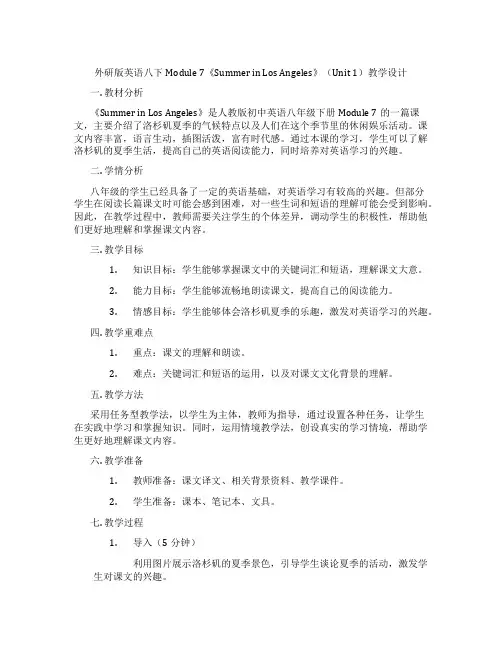
外研版英语八下Module 7《Summer in Los Angeles》(Unit 1)教学设计一. 教材分析《Summer in Los Angeles》是人教版初中英语八年级下册Module 7的一篇课文,主要介绍了洛杉矶夏季的气候特点以及人们在这个季节里的休闲娱乐活动。
课文内容丰富,语言生动,插图活泼,富有时代感。
通过本课的学习,学生可以了解洛杉矶的夏季生活,提高自己的英语阅读能力,同时培养对英语学习的兴趣。
二. 学情分析八年级的学生已经具备了一定的英语基础,对英语学习有较高的兴趣。
但部分学生在阅读长篇课文时可能会感到困难,对一些生词和短语的理解可能会受到影响。
因此,在教学过程中,教师需要关注学生的个体差异,调动学生的积极性,帮助他们更好地理解和掌握课文内容。
三. 教学目标1.知识目标:学生能够掌握课文中的关键词汇和短语,理解课文大意。
2.能力目标:学生能够流畅地朗读课文,提高自己的阅读能力。
3.情感目标:学生能够体会洛杉矶夏季的乐趣,激发对英语学习的兴趣。
四. 教学重难点1.重点:课文的理解和朗读。
2.难点:关键词汇和短语的运用,以及对课文文化背景的理解。
五. 教学方法采用任务型教学法,以学生为主体,教师为指导,通过设置各种任务,让学生在实践中学习和掌握知识。
同时,运用情境教学法,创设真实的学习情境,帮助学生更好地理解课文内容。
六. 教学准备1.教师准备:课文译文、相关背景资料、教学课件。
2.学生准备:课本、笔记本、文具。
七. 教学过程1.导入(5分钟)利用图片展示洛杉矶的夏季景色,引导学生谈论夏季的活动,激发学生对课文的兴趣。
2.呈现(10分钟)教师带领学生朗读课文,边读边解释生词和短语,让学生对课文有一个整体的理解。
3.操练(15分钟)学生分角色朗读课文,模仿文中人物的动作和表情,体会课文的情感。
教师巡回指导,纠正发音和表达错误。
4.巩固(10分钟)学生根据课文内容,完成相关练习题,检查对课文的理解。
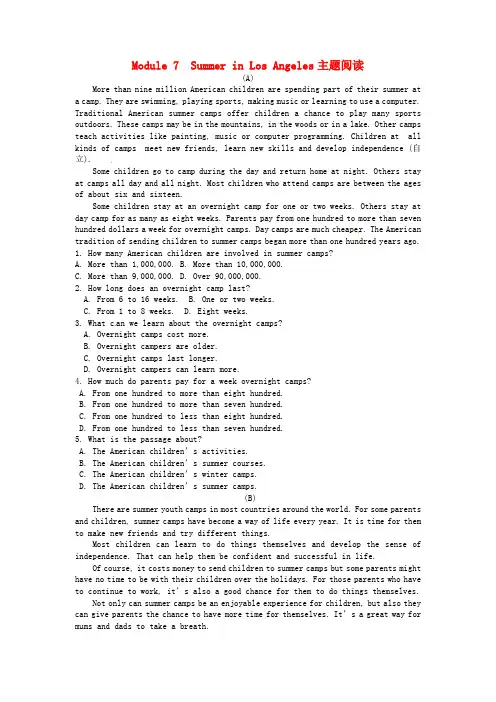
Module 7 Summer in Los Angeles主题阅读(A)More than nine million American children are spending part of their summer ata camp. They are swimming, playing sports, making music or learning to use a computer. Traditional American summer camps offer children a chance to play many sports outdoors. These camps may be in the mountains, in the woods or in a lake. Other campsteach activities like painting, music or computer programming. Children at all kinds of camps meet new friends, learn new skills and develop independence (自立).Some children go to camp during the day and return home at night. Others stayat camps all day and all night. Most children who attend camps are between the agesof about six and sixteen.Some children stay at an overnight camp for one or two weeks. Others stay atday camp for as many as eight weeks. Parents pay from one hundred to more than seven hundred dollars a week for overnight camps. Day camps are much cheaper. The American tradition of sending children to summer camps began more than one hundred years ago.1. How many American children are involved in summer camps?A. More than 1,000,000.B. More than 10,000,000.C. More than 9,000,000.D. Over 90,000,000.2. How long does an overnight camp last?A. From 6 to 16 weeks.B. One or two weeks.C. From 1 to 8 weeks.D. Eight weeks.3. What c an we learn about the overnight camps?A. Overnight camps cost more.B. Overnight campers are older.C. Overnight camps last longer.D. Overnight campers can learn more.4. How much do parents pay for a week overnight camps?A. From one hundred to more than eight hundred.B. From one hundred to more than seven hundred.C. From one hundred to less than eight hundred.D. From one hundred to less than seven hundred.5. What is the passage about?A. The American children’s activities.B. The American children’s summer courses.C. The American children’s winter camps.D. The American children’s summer camps.(B)There are summer youth camps in most countries around the world. For some parentsand children, summer camps have become a way of life every year. It is time for themto make new friends and try different things.Most children can learn to do things themselves and develop the sense of independence. That can help them be confident and successful in life.Of course, it costs money to send children to summer camps but some parents mighthave no time to be with their children over the holidays. For those parents who haveto continue to work, it’s also a good chance for them to do things themselves.Not only can summer camps be an enjoyable experience for children, but also theycan give parents the chance to have more time for themselves. It’s a great way for mums and dads to take a breath.If you choose a summer camp, you can use it as a chance to improve their skills. Your children can get many skills such as learning languages, general practical skills, problem-solving activities and so on, or even social skills for children. You may have many reasons for sending your children to a summer camp, but you can be sure that they will be having fun. These camps can teach people in an interesting environment and they can get the most val uable experience.1. What does the writer think of summer camps?A. It’s a waste of time to take part in them.B. Th ey are really boring.C. They aren’t important at all.D. They are very useful.2. The summer camps can help children ______ .A. learn to do thingsB. be more lonelyC. depend on parentsD. be tired3. If a kid is in a summer camp, he can get skills EXCEPT _______ .A. language learningB. practical skillsC. fight with othersD. problem-solving4. Which of the following is RIGHT about summer camps?A. Only China has summer camps.B. They may cost too much money.C. They may be dangerous for kids.D. They can help people get the useful experience.5. What is this passage about?A. Why we take part in summer camps.B. When we take part in summer camps.C. How long we will stay in summer camps.D. What we will do in summer camps.主题阅读(A)1—5 CBABD(B)1—5 DACDA。
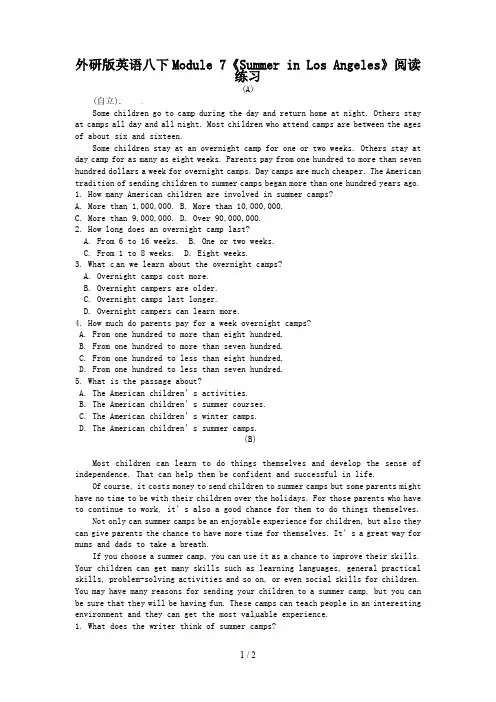
外研版英语八下Module 7《Summer in Los Angeles》阅读练习(A)(自立).Some children go to camp during the day and return home at night. Others stay at camps all day and all night. Most children who attend camps are between the ages of about six and sixteen.Some children stay at an overnight camp for one or two weeks. Others stay at day camp for as many as eight weeks. Parents pay from one hundred to more than seven hundred dollars a week for overnight camps. Day camps are much cheaper. The American tradition of sending children to summer camps began more than one hundred years ago.1. How many American children are involved in summer camps?A. More than 1,000,000.B. More than 10,000,000.C. More than 9,000,000.D. Over 90,000,000.2. How long does an overnight camp last?A. From 6 to 16 weeks.B. One or two weeks.C. From 1 to 8 weeks.D. Eight weeks.3. What c an we learn about the overnight camps?A. Overnight camps cost more.B. Overnight campers are older.C. Overnight camps last longer.D. Overnight campers can learn more.4. How much do parents pay for a week overnight camps?A. From one hundred to more than eight hundred.B. From one hundred to more than seven hundred.C. From one hundred to less than eight hundred.D. From one hundred to less than seven hundred.5. What is the passage about?A. The American children’s activities.B. The American children’s summer courses.C. The American children’s winter camps.D. The American children’s summer camps.(B)Most children can learn to do things themselves and develop the sense of independence. That can help them be confident and successful in life.Of course, it costs money to send children to summer camps but some parents might have no time to be with their children over the holidays. For those parents who have to continue to work, it’s also a good chance for them to do things themselves.Not only can summer camps be an enjoyable experience for children, but also they can give parents the chance to have more time for themselves. It’s a great way for mums and dads to take a breath.If you choose a summer camp, you can use it as a chance to improve their skills. Your children can get many skills such as learning languages, general practical skills, problem-solving activities and so on, or even social skills for children. You may have many reasons for sending your children to a summer camp, but you can be sure that they will be having fun. These camps can teach people in an interesting environment and they can get the most val uable experience.1. What does the writer think of summer camps?A. It’s a waste of time to take part in them.B. Th ey are really boring.C. They aren’t important at all.D. They are very useful.2. The summer camps can help children ______ .A. learn to do thingsB. be more lonelyC. depend on parentsD. be tired3. If a kid is in a summer camp, he can get skills EXCEPT _______ .A. language learningB. practical skillsC. fight with othersD. problem-solving4. Which of the following is RIGHT about summer camps?A. Only China has summer camps.B. They may cost too much money.C. They may be dangerous for kids.D. They can help people get the useful experience.5. What is this passage about?A. Why we take part in summer camps.B. When we take part in summer camps.C. How long we will stay in summer camps.D. What we will do in summer camps.主题阅读(A)1—5 CBABD(B)1—5 DACDA。
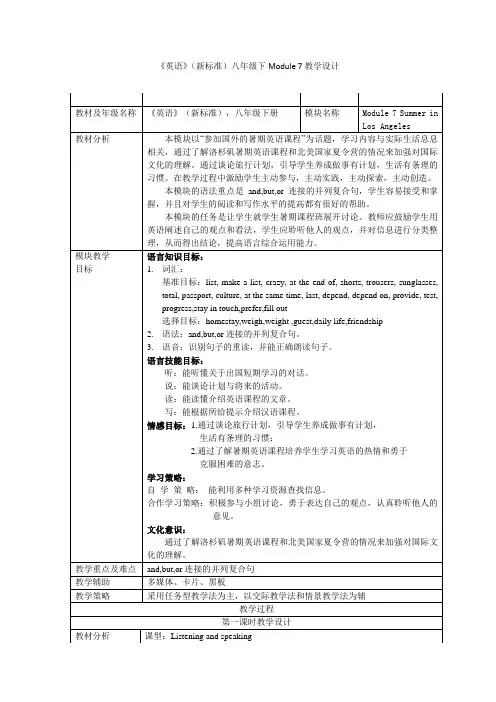
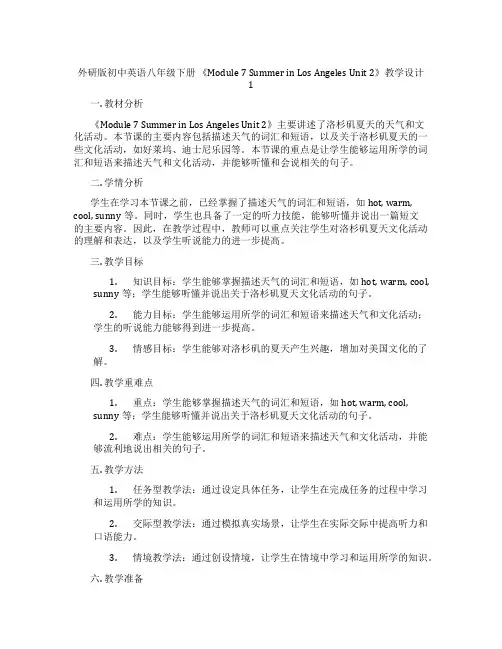
外研版初中英语八年级下册《Module 7 Summer in Los Angeles Unit 2》教学设计1一. 教材分析《Module 7 Summer in Los Angeles Unit 2》主要讲述了洛杉矶夏天的天气和文化活动。
本节课的主要内容包括描述天气的词汇和短语,以及关于洛杉矶夏天的一些文化活动,如好莱坞、迪士尼乐园等。
本节课的重点是让学生能够运用所学的词汇和短语来描述天气和文化活动,并能够听懂和会说相关的句子。
二. 学情分析学生在学习本节课之前,已经掌握了描述天气的词汇和短语,如hot, warm, cool, sunny等。
同时,学生也具备了一定的听力技能,能够听懂并说出一篇短文的主要内容。
因此,在教学过程中,教师可以重点关注学生对洛杉矶夏天文化活动的理解和表达,以及学生听说能力的进一步提高。
三. 教学目标1.知识目标:学生能够掌握描述天气的词汇和短语,如hot, warm, cool,sunny等;学生能够听懂并说出关于洛杉矶夏天文化活动的句子。
2.能力目标:学生能够运用所学的词汇和短语来描述天气和文化活动;学生的听说能力能够得到进一步提高。
3.情感目标:学生能够对洛杉矶的夏天产生兴趣,增加对美国文化的了解。
四. 教学重难点1.重点:学生能够掌握描述天气的词汇和短语,如hot, warm, cool,sunny等;学生能够听懂并说出关于洛杉矶夏天文化活动的句子。
2.难点:学生能够运用所学的词汇和短语来描述天气和文化活动,并能够流利地说出相关的句子。
五. 教学方法1.任务型教学法:通过设定具体任务,让学生在完成任务的过程中学习和运用所学的知识。
2.交际型教学法:通过模拟真实场景,让学生在实际交际中提高听力和口语能力。
3.情境教学法:通过创设情境,让学生在情境中学习和运用所学的知识。
六. 教学准备1.教学材料:教材、多媒体课件、录音机、磁带等。
2.教学环境:教室、多媒体设备等。
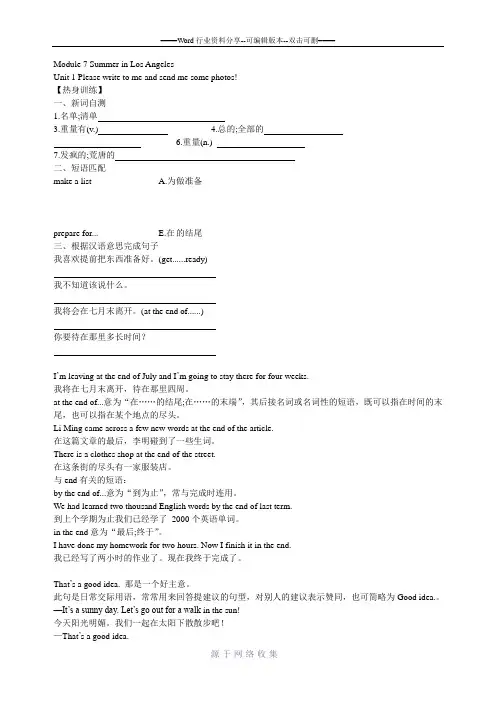
Module 7 Summer in Los AngelesUnit 1 Please write to me and send me some photos!【热身训练】一、新词自测1.名单;清单3.重量有(v.)4.总的;全部的6.重量(n.)7.发疯的;荒唐的二、短语匹配make a list A.为做准备prepare for... E.在的结尾三、根据汉语意思完成句子我喜欢提前把东西准备好。
(get......ready)我不知道该说什么。
我将会在七月末离开。
(at the end of......)你要待在那里多长时间?I’m leaving at the end of July and I’m going to stay there for four weeks.我将在七月末离开,待在那里四周。
at the end of...意为“在……的结尾;在……的末端”,其后接名词或名词性的短语,既可以指在时间的末尾,也可以指在某个地点的尽头。
Li Ming came across a few new words at the end of the article.在这篇文章的最后,李明碰到了一些生词。
There is a clothes shop at the end of the street.在这条街的尽头有一家服装店。
与end有关的短语:by the end of...意为“到为止”,常与完成时连用。
We had learned two thousand English words by the end of last term.到上个学期为止我们已经学了2000个英语单词。
in the end意为“最后;终于”。
I have done my homework for two hours. Now I finish it in the end.我已经写了两小时的作业了。
现在我终于完成了。
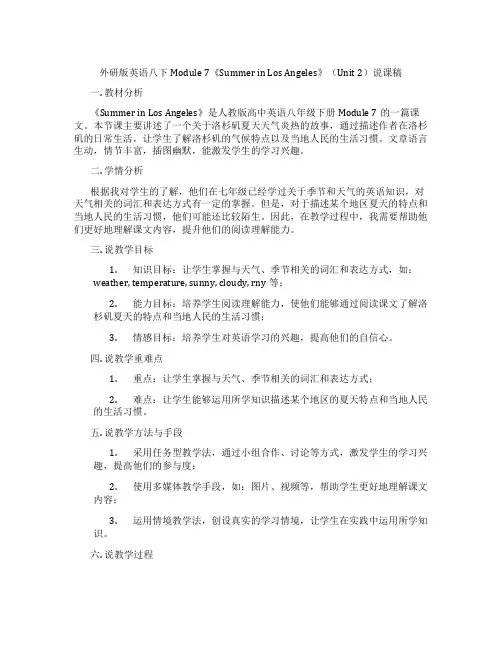
外研版英语八下Module 7《Summer in Los Angeles》(Unit 2)说课稿一. 教材分析《Summer in Los Angeles》是人教版高中英语八年级下册Module 7的一篇课文。
本节课主要讲述了一个关于洛杉矶夏天天气炎热的故事,通过描述作者在洛杉矶的日常生活,让学生了解洛杉矶的气候特点以及当地人民的生活习惯。
文章语言生动,情节丰富,插图幽默,能激发学生的学习兴趣。
二. 学情分析根据我对学生的了解,他们在七年级已经学过关于季节和天气的英语知识,对天气相关的词汇和表达方式有一定的掌握。
但是,对于描述某个地区夏天的特点和当地人民的生活习惯,他们可能还比较陌生。
因此,在教学过程中,我需要帮助他们更好地理解课文内容,提升他们的阅读理解能力。
三. 说教学目标1.知识目标:让学生掌握与天气、季节相关的词汇和表达方式,如:weather, temperature, sunny, cloudy, rny等;2.能力目标:培养学生阅读理解能力,使他们能够通过阅读课文了解洛杉矶夏天的特点和当地人民的生活习惯;3.情感目标:培养学生对英语学习的兴趣,提高他们的自信心。
四. 说教学重难点1.重点:让学生掌握与天气、季节相关的词汇和表达方式;2.难点:让学生能够运用所学知识描述某个地区的夏天特点和当地人民的生活习惯。
五. 说教学方法与手段1.采用任务型教学法,通过小组合作、讨论等方式,激发学生的学习兴趣,提高他们的参与度;2.使用多媒体教学手段,如:图片、视频等,帮助学生更好地理解课文内容;3.运用情境教学法,创设真实的学习情境,让学生在实践中运用所学知识。
六. 说教学过程1.导入:通过展示洛杉矶的图片,引导学生谈论关于天气和季节的话题,为新课的学习做好铺垫;2.读前预测:让学生根据课文标题和插图,预测课文内容,激发他们的阅读兴趣;3.快速阅读:让学生快速阅读课文,回答关于课文大意的问题,帮助他们整体把握课文内容;4.精读:引导学生深入阅读课文,理解作者在洛杉矶的日常生活,以及洛杉矶夏天的特点和当地人民的生活习惯;5.小组讨论:让学生分小组讨论,用自己的话描述一下自己所熟悉的季节特点和当地人民的生活习惯,培养他们的口语表达能力;6.输出:让学生结合所学知识,运用所掌握的词汇和表达方式,写一篇关于某个地区夏天的短文,培养他们的写作能力;7.总结:对本节课所学内容进行总结,让学生回顾所学知识,提高他们的归纳总结能力。
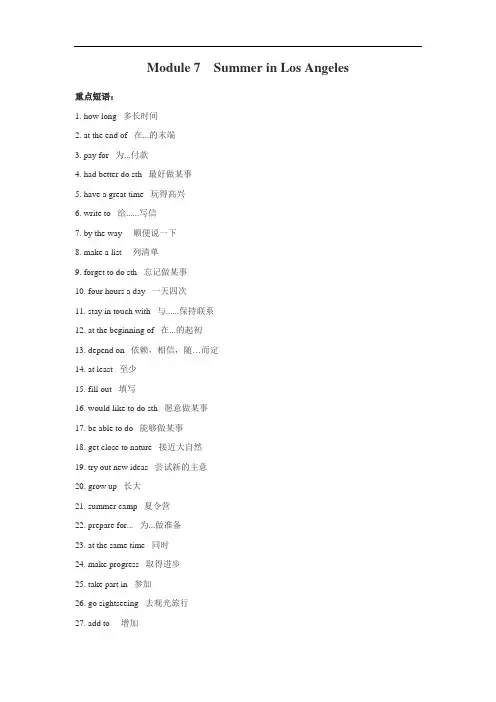
Module 7 Summer in Los Angeles 重点短语:1. how long 多长时间2. at the end of 在...的末端3. pay for 为...付款4. had better do sth 最好做某事5. have a great time 玩得高兴6. write to 给......写信7. by the way 顺便说一下8. make a list 列清单9. forget to do sth 忘记做某事10. four hours a day 一天四次11. stay in touch with 与......保持联系12. at the beginning of 在...的起初13. depend on 依赖,相信,随…而定14. at least 至少15. fill out 填写16. would like to do sth 愿意做某事17. be able to do 能够做某事18. get close to nature 接近大自然19. try out new ideas 尝试新的主意20. grow up 长大21. summer camp 夏令营22. prepare for... 为...做准备23. at the same time 同时24. make progress 取得进步25. take part in 参加26. go sightseeing 去观光旅行27. add to 增加28. agree/disagree with... 同意/不同意...语法总结:1.Lingling is preparing for her trip to LA.prepare for sth 准备做某事I prepare for my final exam.2.I am leaving at the end of July.at the end of +时间/ 地点在...的末尾by the end of +时间到...为止in the end 在最后3.Is 200 dollars enough?钱、距离、长度等通常作为整体出现,谓语动词用单数。
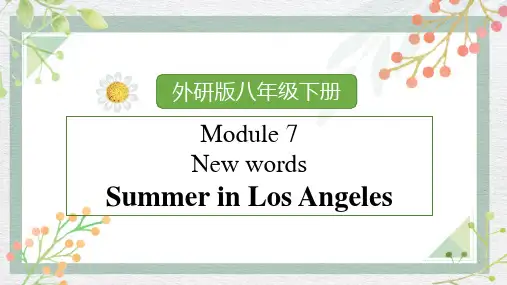
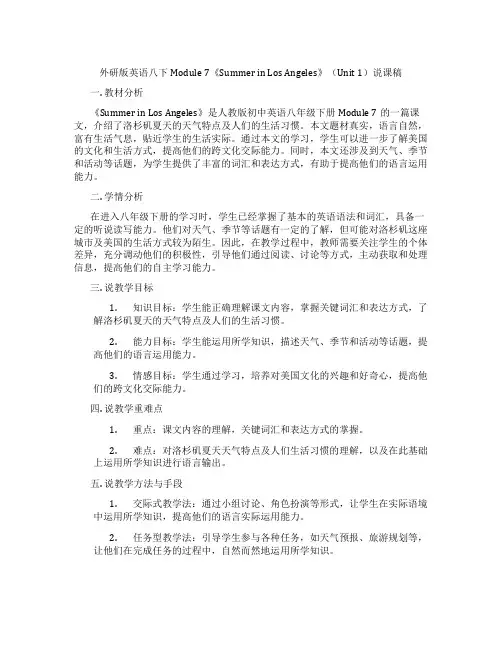
外研版英语八下Module 7《Summer in Los Angeles》(Unit 1)说课稿一. 教材分析《Summer in Los Angeles》是人教版初中英语八年级下册Module 7的一篇课文,介绍了洛杉矶夏天的天气特点及人们的生活习惯。
本文题材真实,语言自然,富有生活气息,贴近学生的生活实际。
通过本文的学习,学生可以进一步了解美国的文化和生活方式,提高他们的跨文化交际能力。
同时,本文还涉及到天气、季节和活动等话题,为学生提供了丰富的词汇和表达方式,有助于提高他们的语言运用能力。
二. 学情分析在进入八年级下册的学习时,学生已经掌握了基本的英语语法和词汇,具备一定的听说读写能力。
他们对天气、季节等话题有一定的了解,但可能对洛杉矶这座城市及美国的生活方式较为陌生。
因此,在教学过程中,教师需要关注学生的个体差异,充分调动他们的积极性,引导他们通过阅读、讨论等方式,主动获取和处理信息,提高他们的自主学习能力。
三. 说教学目标1.知识目标:学生能正确理解课文内容,掌握关键词汇和表达方式,了解洛杉矶夏天的天气特点及人们的生活习惯。
2.能力目标:学生能运用所学知识,描述天气、季节和活动等话题,提高他们的语言运用能力。
3.情感目标:学生通过学习,培养对美国文化的兴趣和好奇心,提高他们的跨文化交际能力。
四. 说教学重难点1.重点:课文内容的理解,关键词汇和表达方式的掌握。
2.难点:对洛杉矶夏天天气特点及人们生活习惯的理解,以及在此基础上运用所学知识进行语言输出。
五. 说教学方法与手段1.交际式教学法:通过小组讨论、角色扮演等形式,让学生在实际语境中运用所学知识,提高他们的语言实际运用能力。
2.任务型教学法:引导学生参与各种任务,如天气预报、旅游规划等,让他们在完成任务的过程中,自然而然地运用所学知识。
3.情境教学法:通过创设情境,如天气变化、季节活动等,让学生在真实的环境中感受和理解语言。
4.多媒体教学手段:利用课件、视频等资源,为学生提供丰富的视觉和听觉材料,提高他们的学习兴趣。
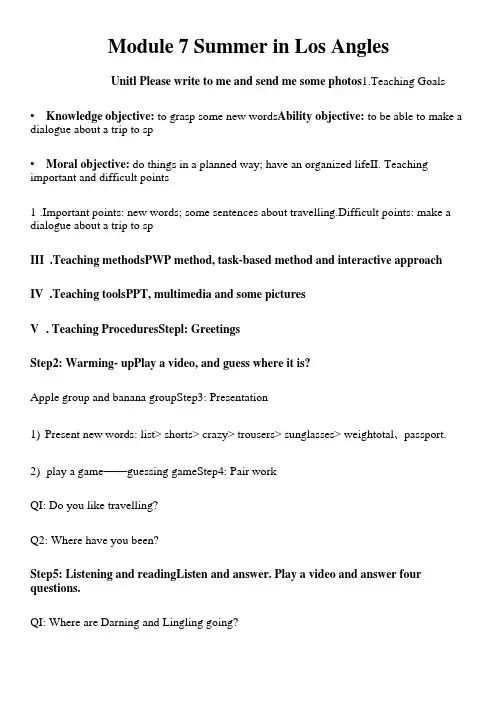
Module 7 Summer in Los AnglesUnitl Please write to me and send me some photos1.Teaching Goals •Knowledge objective: to grasp some new words Ability objective: to be able to make a dialogue about a trip to sp•Moral objective: do things in a planned way; have an organized lifeII. Teaching important and difficult points1.Important points: new words; some sentences about travelling.Difficult points: make a dialogue about a trip to spIII.Teaching methodsPWP method, task-based method and interactive approach IV.Teaching toolsPPT, multimedia and some picturesV. Teaching ProceduresStepl: GreetingsStep2: Warming- upPlay a video, and guess where it is?Apple group and banana groupStep3: Presentation1)Present new words: list> shorts> crazy> trousers> sunglasses> weightotal、passport.2)play a game——guessing gameStep4: Pair workQI: Do you like travelling?Q2: Where have you been?Step5: Listening and readingListen and answer. Play a video and answer four questions.QI: Where are Darning and Lingling going?Q2: What are they going to do?Q3: How long will they stay?Q4: How many students are there in the group?1)Listen and read. Play a flash to answer the question.Lingling should take dollars^ a dictionary^ shorts> a passport、notebooks> pens.3)Listen it again and write down the missing words.4)Read it together and find out the important sentences.Important sentences:Step 6: Practice Work in pairs: imagine you are going to travel to Shanghai, and make a dialogue with your partner about your plans.Work in pairs:imagine you are going to travel to Shanghai, and make a dialogue with your partner about your plans.Step7: Homework。